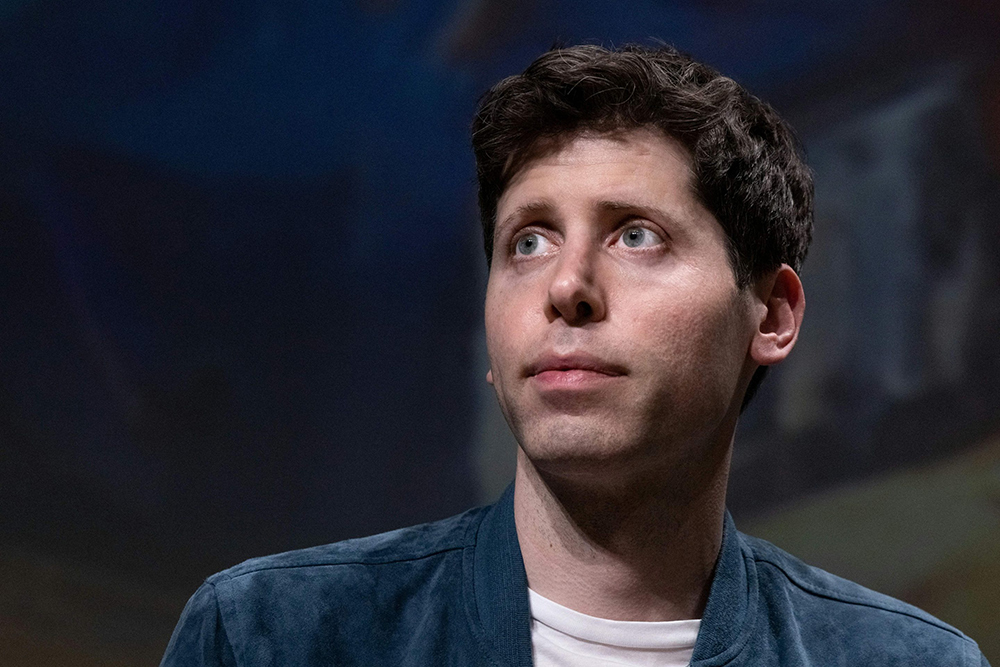
山姆·奥特曼支持的Worldcoin在周三公布了开发路线图,其中包括用于支持其眼部扫描生态系统开发商的500万美元拨款项目,以及其去中心化计划的概况。不过,这个去中心化计划对于这个雄心勃勃的资本密集
型项目来说是一个巨大的挑战。
去中心化是加密货币的首要承诺之一。在传统金融中,资金与交易由政府或银行这类中间机构掌控,但在加密货币构建的未来中,各种系统则完全由密码掌控。
最明显的案例莫过于比特币,这是首款遵循去中心化软件协定的加密货币。它的基础是名为区块链的分类账户,记录了每笔交易的信息。尽管其基础设施由多家核心开发商维护,但比特币这一根基是无法改变的,而且可供任何人查阅。
随着加密货币应用的激增,去中心化理念却变得越发微妙。毕竟,区块链项目必须有一个发起方,而且即便这些项目会承诺打造更加去中心化的未来,但创建者通常会维持一定程度的控制、影响力,并提供一些激励政策。
人形机器人是否预想过去中心化球体的面世?
作为加密货币最知名的项目之一,Worldcoin当前便在努力应对这个问题。该公司由山姆·奥特曼创建于2020年,它有一项充满未来主义色彩的业务,通过扫描虹膜来证实某人的“人类身份”,并向被扫描者赠送一枚加密货币代币作为奖励。随着人工智能业务的增长,该项目希望创建一项机制,以便区分人类用户和线上机器人,同时还要打造一个普遍基本收入系统,以规避人工智能可能会导致的任何经济震荡。
与众多加密货币项目一样,Worldcoin以去中心化协定自居,而且称自己由全人类共同掌控,而不是仅由奥特曼或该公司财大气粗的投资者安德里森·霍罗威茨等少数影响力人物说了算。受此影响,Worldcoin于2022年创建了Worldcoin Foundation,并将其作为该项目的非盈利性掌舵人。公司的业务发展仍由Tools for Humanity负责,后者是一家盈利性实体,获得了数千万美元的风投资本,并由奥特曼担任其主席。
Worldcoin昂贵的流程为去中心化带来了一个重大挑战。其“个人身份证明”协定要求用户接受其专属球体的扫描,而这个球体造价数千美元。同时,由于采集生物指标数据会引发人们的隐私担忧,因此需要开展严格的尽职调查。当前,Tools for Humanity是该球体的独家制造商,不过,公司已经公开了该球体的设计内容。
在接受《财富》杂志采访时, Tools for Humanity首席执行官亚历克斯·布拉尼亚与Worldcoin Foundation协定负责人雷姆科·布洛门讲述了其愿景。在不久的将来,Tools for Humanity将成为球体的众多生产商之一,而且开发者可以打造其他系统来验证用户的人类特征,且无需进行复杂的虹膜扫描。治理和决策将不再由Tools for Humanity或Worldcoin Foundation全权负责,而是交给民主氛围更加浓厚的去中心化自治机构。
布洛门称,大多数加密货币协定仅以软件的形式存在,这意味着行业对集中化的定义“非常狭隘地局限于这种理想化的空间,即一切事物都是由密码和数字来定义。为了实现去中心化,我们需要让这个定义走出这个限定,从而将真实世界纳入其中。”
拨款计划是这一愿景的一部分,其资金在理论上会拨给能够在Tools for Humanity外部推动Worldconin发展的开发商。
然而,对于一个旨在于全球范围内颠覆身份和经济学认知的项目来说,事实证明,要摆脱集中化的缺点将是十分困难的,即便Worldcoin Foundation与Tools for Humanity之间似乎也存在着千丝万缕的联系,因此也催生了一批令人感到困惑的实体机构。这些机构相互独立,但却又密不可分。例如,布洛门在加入Worldcoin Foundation之前便效力于Tools for Humanity。Worldcoin Foundation的三位董事中有两名都是 Tools for Humanity的早期雇员。网站上并未提及第三位董事的姓名,也没有提供Worldcoin Foundation剩余10名雇员的信息。
去中心化依然是一个模棱两可的概念,对于监管方而言更是如此。受此影响,Worldcoin选择不在美国发行其代币,原因是担心违反美国证券交易委员会的规定。布拉尼亚对《财富》杂志说,考虑到不同利益相关方在定义上依然存在分歧,因此Worldcoin不会发布其去中心化目标的时间表。(财富中文网)
译者:冯丰
审校:夏林
山姆·奥特曼支持的Worldcoin在周三公布了开发路线图,其中包括用于支持其眼部扫描生态系统开发商的500万美元拨款项目,以及其去中心化计划的概况。不过,这个去中心化计划对于这个雄心勃勃的资本密集型项目来说是一个巨大的挑战。
去中心化是加密货币的首要承诺之一。在传统金融中,资金与交易由政府或银行这类中间机构掌控,但在加密货币构建的未来中,各种系统则完全由密码掌控。
最明显的案例莫过于比特币,这是首款遵循去中心化软件协定的加密货币。它的基础是名为区块链的分类账户,记录了每笔交易的信息。尽管其基础设施由多家核心开发商维护,但比特币这一根基是无法改变的,而且可供任何人查阅。
随着加密货币应用的激增,去中心化理念却变得越发微妙。毕竟,区块链项目必须有一个发起方,而且即便这些项目会承诺打造更加去中心化的未来,但创建者通常会维持一定程度的控制、影响力,并提供一些激励政策。
人形机器人是否预想过去中心化球体的面世?
作为加密货币最知名的项目之一,Worldcoin当前便在努力应对这个问题。该公司由山姆·奥特曼创建于2020年,它有一项充满未来主义色彩的业务,通过扫描虹膜来证实某人的“人类身份”,并向被扫描者赠送一枚加密货币代币作为奖励。随着人工智能业务的增长,该项目希望创建一项机制,以便区分人类用户和线上机器人,同时还要打造一个普遍基本收入系统,以规避人工智能可能会导致的任何经济震荡。
与众多加密货币项目一样,Worldcoin以去中心化协定自居,而且称自己由全人类共同掌控,而不是仅由奥特曼或该公司财大气粗的投资者安德里森·霍罗威茨等少数影响力人物说了算。受此影响,Worldcoin于2022年创建了Worldcoin Foundation,并将其作为该项目的非盈利性掌舵人。公司的业务发展仍由Tools for Humanity负责,后者是一家盈利性实体,获得了数千万美元的风投资本,并由奥特曼担任其主席。
Worldcoin昂贵的流程为去中心化带来了一个重大挑战。其“个人身份证明”协定要求用户接受其专属球体的扫描,而这个球体造价数千美元。同时,由于采集生物指标数据会引发人们的隐私担忧,因此需要开展严格的尽职调查。当前,Tools for Humanity是该球体的独家制造商,不过,公司已经公开了该球体的设计内容。
在接受《财富》杂志采访时, Tools for Humanity首席执行官亚历克斯·布拉尼亚与Worldcoin Foundation协定负责人雷姆科·布洛门讲述了其愿景。在不久的将来,Tools for Humanity将成为球体的众多生产商之一,而且开发者可以打造其他系统来验证用户的人类特征,且无需进行复杂的虹膜扫描。治理和决策将不再由Tools for Humanity或Worldcoin Foundation全权负责,而是交给民主氛围更加浓厚的去中心化自治机构。
布洛门称,大多数加密货币协定仅以软件的形式存在,这意味着行业对集中化的定义“非常狭隘地局限于这种理想化的空间,即一切事物都是由密码和数字来定义。为了实现去中心化,我们需要让这个定义走出这个限定,从而将真实世界纳入其中。”
拨款计划是这一愿景的一部分,其资金在理论上会拨给能够在Tools for Humanity外部推动Worldconin发展的开发商。
然而,对于一个旨在于全球范围内颠覆身份和经济学认知的项目来说,事实证明,要摆脱集中化的缺点将是十分困难的,即便Worldcoin Foundation与Tools for Humanity之间似乎也存在着千丝万缕的联系,因此也催生了一批令人感到困惑的实体机构。这些机构相互独立,但却又密不可分。例如,布洛门在加入Worldcoin Foundation之前便效力于Tools for Humanity。Worldcoin Foundation的三位董事中有两名都是 Tools for Humanity的早期雇员。网站上并未提及第三位董事的姓名,也没有提供Worldcoin Foundation剩余10名雇员的信息。
去中心化依然是一个模棱两可的概念,对于监管方而言更是如此。受此影响,Worldcoin选择不在美国发行其代币,原因是担心违反美国证券交易委员会的规定。布拉尼亚对《财富》杂志说,考虑到不同利益相关方在定义上依然存在分歧,因此Worldcoin不会发布其去中心化目标的时间表。(财富中文网)
译者:冯丰
审校:夏林
The Sam Altman–backed Worldcoin announced a development road map on Wednesday, including a $5 million grants program to support developers in its eye-scanning ecosystem, as well as an outline of its plans to decentralize—a steep challenge for the ambitious and capital-intensive project.
Decentralization is a core promise of crypto. Rather than traditional finance, where money and transactions are controlled by governments or intermediaries like banks, crypto acolytes promise a future where systems instead are governed by code.
The best example is Bitcoin, the first cryptocurrency that functions as a decentralized software protocol. Although its infrastructure is maintained by a core set of developers, the foundation of Bitcoin—the decentralized ledger called a blockchain that records every transaction—is immutable and viewable by anyone.
As the applications of crypto have proliferated, the idea of decentralization has become trickier. A project has to originate from somewhere, after all, and the creators often maintain some degree of control, influence, and incentives, even as they promise a more democratized future.
Do androids dream of decentralized orbs?
Worldcoin, one of the most prominent projects in crypto, is currently grappling with the question. Cofounded by Sam Altman in 2020, it has a futuristic premise of proving someone’s “personhood” by scanning their iris, and giving them a crypto token as a reward. As the presence of artificial intelligence grows, the project hopes to create both a mechanism to differentiate between human users and bots online as well as a system of universal basic income to stave off any economic upheaval created by AI.
Like many crypto projects, Worldcoin has positioned itself as a decentralized protocol that will be in the hands of all of humanity, not just powerful figures like Altman and the deep-pocketed investors like Andreessen Horowitz who backed the company. As such, Worldcoin created the Worldcoin Foundation in 2022 to serve as a nonprofit steward of the project. Its development is still maintained by Tools for Humanity, the for-profit entity that’s received hundreds of millions in venture funding and counts Altman as its chairperson.
The costly process of Worldcoin presents a key challenge to decentralization. Its “proof-of-personhood” protocol requires users to be scanned by its proprietary orb, which costs thousands of dollars to produce, and concerns around privacy due to the capture of biometric data require a high degree of due diligence. Currently, Tools for Humanity is the only manufacturer of the orbs, although the project has made its designs open-source.
In an interview with Fortune, Tools for Humanity CEO Alex Blania and Worldcoin Foundation head of protocol Remco Bloemen laid out their vision. In the not-so-distant future, Tools for Humanity would be just one of many manufacturers of the orbs, and developers could create another system to verify users’ humanness that didn’t involve complicated iris scans. Governance and decision-making would no longer be concentrated in Tools for Humanity, or even the Worldcoin Foundation, and instead through a more democratically inclined DAO, or decentralized autonomous organization.
Most crypto protocols only exist as software, meaning that the industry’s definition of centralization is “very narrow-mindedly focused into this platonic space where everything is defined by cryptography and numbers,” said Bloemen. “What we need to do in order to make this work is push that definition out to actually include the real world.”
The grants program is part of the vision, with funding theoretically going to developers who could expand Worldcoin’s development outside Tools for Humanity.
Still, for a project that’s aiming to upend global conceptions of identity and economics, escaping accusations of centralization will prove difficult. Even the Worldcoin Foundation seems inextricably tied to Tools for Humanity, creating a confusing knot of entities both independent and intertwined. Bloemen, for example, worked at Tools for Humanity before joining the Worldcoin Foundation. Two of the Worldcoin Foundation’s three directors were both early Tools for Humanity employees. The third is not named online, nor are the rest of Worldcoin Foundation’s 10 or so employees.
Decentralization remains a slippery concept, especially for regulators, which has meant that Worldcoin chose not to launch its token in the U.S. for fear of running afoul of the Securities and Exchange Commission. Blania told Fortune that Worldcoin is not releasing a timeline for its decentralization goals because of the gulf in different stakeholders’ definitions.






